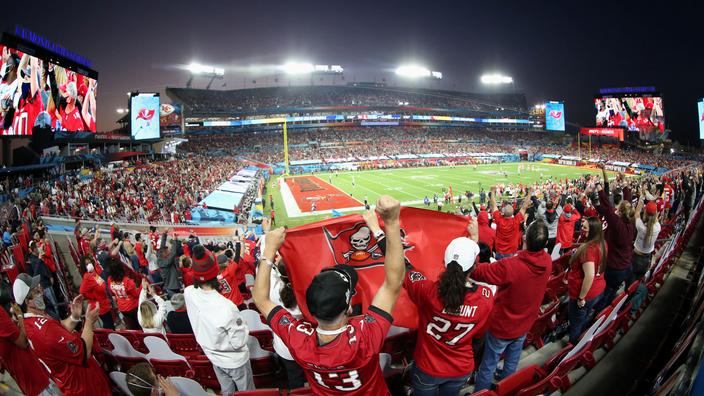Sunday night's Super Bowl TV audience fell 9% from last year.
91.6 million people in the United States watched the final of the American football championship.
We have to go back to 2006 to find such a modest audience.
If you take into account those who watched the Tampa Bay Buccaneers and the Kansas City Chiefs meet on CBS's video-on-demand platform and its smartphone apps, the audience reached 96.4 million. .
Despite this, the figure represents the worst media performance for a Super Bowl since 2007. Only 38% of American households equipped with television watched the game.
Never seen since 1969.
So much for the raw report.
The work of analyzing this dropout has only just begun.
It was even delayed 24 hours by Nielsen: the audience measurement specialist took a day longer than usual to produce his estimate which is authoritative in the media world.
Usually, from Sunday evening we know the number of Americans who watched the game.
Looking back, it appears that the decision of traditional event sponsors like Coca Cola, Anheuser Busch (Budweiser) and Hyundai to abstain this year may have been justified.
A 30-second advertising space during the Super Bowl was still selling for this edition between 5, 5 and 5, 6 million dollars.
Isn't this budget better spent elsewhere and otherwise?
There have been profound changes in the habits of Americans for at least a year.
The economic crisis triggered by the pandemic and the lockdowns has served as an accelerator to noticeable trends for years.
In fact, we see that over the past six years, Super Bowl audiences have declined.
Advertisers must adapt to the new media landscape.
And decide why, in general, live sport on television is less popular today than it was a year ago.
The matches of the American football season saw their audience drop by 7% in 2020. The erosion of the popularity of the Super Bowl is therefore correlated with the decline in interest in the National Football League (NFL).
The Netflix effect
American football nevertheless remains king on the televised "networks".
Of the 100 most watched shows in 2020, 76 were still NFL games.
By comparison, the audience for the finals of the basketball championship (NBA) collapsed by 49%.
That of the Hockey League finals plummeted 61%.
Placed in this alarming context, the Super Bowl remains by far the most unifying sporting event for diverse demographic audiences.
We can speak of the "Netflix effect".
Because televised sport is not the only victim of changes in habits.
During a traumatic year of confinement and anxiety, the audience for conventional television in the United States, all channels combined, fell by 20% at prime time in the evening .
It is true that the alternatives to traditional programs have never been so numerous.
Netflix, Disney +, HBO Max, Peacock, Hulu, Apple TV ... Never before have so many video-on-demand (SVOD) platforms struggled to capture the attention of Americans.
This results in a certain dilution of the ordinary television audience.
There remains another very sensitive element of the explanation for the relative disinterest of a part of America in televised sport: the choice of many black players to use their popularity to denounce police violence and what they deem to be " institutional racism ".
These demonstrations, the sometimes violent outbursts that followed, as well as calls to reduce the budgets of the police, could also distract part of the public.
After years of refusal, several teams in recent months have had to change their names to satisfy activists.
The name "Redskins" ("Redskins") of the Washington NFL team has thus disappeared.
Likewise, the Cleveland baseball team have decided not to call themselves "Cleveland Indians" anymore.
These loss of reference points and the polarization of political life do not help the sport audience.









